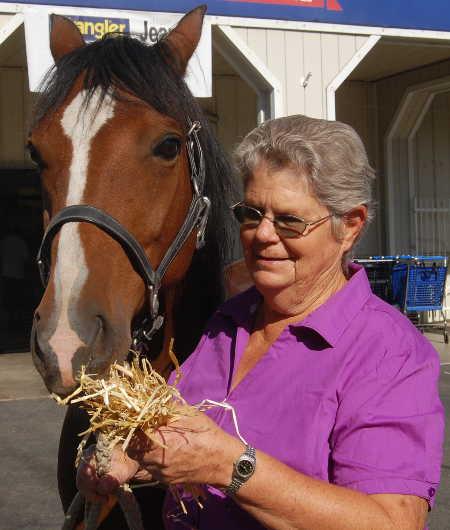
LAKE COUNTY, Calif. – Hay is for horses. But what happens when there is a hay shortage?
Ensuring against such an eventuality is the reason a hay assistance program for horses of Lake and neighboring counties was formed.
The undertaking is under the direction of SAFER North Counties Horse Rescue.
A 501(c)3 nonprofit created by Kate Sullivan of Sonoma County in 2009, SAFER – which stands for “Sonoma Action for Equine Rescue” – has since expanded to include Lake and Mendocino counties.
Since its creation, SAFER has saved more than 80 horses, including 20 through an American Society for the Prevention of Cruelty to Animals matching grant of $4,000 – for a total of $8,000. More than 200 horses have been rehomed by SAFER, according to the organization.
“During the recession we were aware that people who owned horses were leaving their homes without places to keep their horses,” said Angie Herman, a SAFER board member from Mendocino County. “So our focus was to try to help people hang on to those horses by providing feed until they could get back on their feet … and if they were unable to find work or did lose their home we held rehome those horses.”
Herman has two horses of her own and recently lost another that lived to be 34 years old.
Lake County became a supporter of the hay assistance program when Rainbow Agricultural Services in Lakeport began making it possible for horse-loving customers to commit money from their own personal accounts to help feed horses at its cashier stand.
Rainbow Ag clerk Tammy Erickson said the fundraising effort has been successful.
Two Kelseyville area women, Barbara Kroboth and Carlene Cady, have been the liaisons for the hay assistance program in Lake County.
“All four of my children grew up with horses,” said Kroboth. “It kept them occupied and off the street.”
She supports the program because it helps people keep their horses a little longer, she said.
“With the recession it was pretty touch and go there for a while,” she added. “We couldn’t sell horses; nobody would buy them.”
While the vision of families providing a place for horses to live is warming, there's a darker, chilling side.
“Some of them end up in the Petaluma auction yard,” said Herman.
“We would go to the auction to try to get horses out of there. There are buyers who will go to the small local auction yards like Petaluma, bid for horses, and then take them to a larger auction, maybe in Turlock or Fallon, Nevada. The people who attend those auctions we call the ‘meat buyers,’ because they put them on a truck and haul them to Mexico,” she added.
There to become meat or glue.
“Some people take their horse to auction thinking they’ll find a new home,” said Herman, “then finally they get picked up by people who want to pick up 30 to 40 horses all at once.
“We were actually trying to help a person who had 97 stallions. They were not trained. While we were trying to figure out what to do (the horses’ owner) met somebody who offered to take the stallions and give them a wonderful home.
“A couple of days later they hauled them to the Petaluma auction.
“There are so many people out there who will say their daughter or granddaughter always wanted a horse of her own,” she added. “They’ll come up with some very heartwarming stories. People will give up horses only to find out that that person took their horse straight to auction so they could make a few bucks on them.”
Kroboth said that very few Lake County horses are sold to people who are in the quick-buck horse business, partly because the closest auction is in Petaluma.
SAFER is waging a strenuous campaign to save horses from inhumane lives and, ultimately, deaths.
“We have actually taken in a few horses from animal control who have been extremely emaciated,” says Herman. “One we took in was really untouchable ... I don’t know if he was abused or incredibly frightened, but most of them have new homes and new people and are doing beautifully.
“It really surprises you when you see how much they can come back,” she said. “Some look like walking skeletons. It may take several months, but they do come around and they can be great horses.”
For more information or to donate, visit www.saferhorse.com .
Email John Lindblom at

 How to resolve AdBlock issue?
How to resolve AdBlock issue? 



